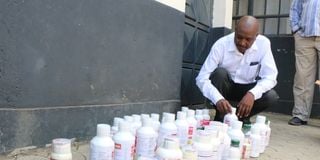Fake farm inputs crisis rattles Nakuru county officials

A DCI officer looks over at impounded agricultural inputs captured some time last year.
The rise in arrests and convictions linked to counterfeit agrochemical and veterinary products in Nakuru is sparking serious concern across the agricultural sector.
As one of Kenya’s key food production hubs, Nakuru relies heavily on these inputs for crop and livestock health but the growing infiltration of fake products is putting both livelihoods and public safety at risk.
Recent crackdowns by regulatory agencies have revealed an alarming number of unlicensed dealers operating in urban markets and rural trading centers.
Just over a week ago, the Kenya Veterinary Board (KVB) arrested a person from Nakuru for operating their veterinary practice without a license as sacks of fake fertilizers were intercepted in Molo last month.
From diluted pesticides to expired animal vaccines, farmers are unknowingly purchasing ineffective and often harmful products, with devastating consequences on yields, animal health, and ultimately food security.
Authorities say the trend is not only criminal but poses a significant threat to the integrity of the county’s agricultural value chain.
Leonard Bor, CECM for Agriculture, Livestock, Fisheries, and Veterinary Services, says the county is actively working with various partners to increase surveillance at agrochemical distribution points to prevent fake products from entering the market.
“We’ve been educating agrochemical dealers and farmers about recognizing legitimate products and reporting suspicious ones,” Bor explains. “Farmers should always check labels for the correct product and expiry details.”
He highlights that agrochemical products now often feature scratch-off panels to verify authenticity, allowing farmers and dealers to check if the product is original.
Dr. Duncan Langat, Acting Director at the Nakuru County Department of Veterinary Services, echoes the CECM’s sentiments, noting that in the veterinary sector, the rise of counterfeit veterinary drugs and unauthorized practitioners is a growing concern.
He explains that through a collaboration with the Kenya Veterinary Board (KVB), they’re actively working to ensure veterinary services are provided only by qualified veterinarians and certified animal health practitioners.
“Veterinary practice is one of the fields most infiltrated by quacks,” Dr. Langat notes. “In many cases, farmers administer treatment to their animals themselves, relying on limited knowledge and unsupervised drug use.”
This self-treatment, he warns, often ignores crucial food hygiene practices such as observing drug withdrawal periods in meat, milk, and eggs, a lapse that can lead to serious health hazards for consumers.
To address this, one of the actions in the sector is compiling a public list of certified veterinary and animal health professionals across all wards with the goal is to help farmers easily identify and consult qualified personnel when seeking animal healthcare.
He also points out that agrovet shops, that supply veterinary drugs, must operate under strict guidelines.
“Certain medications, especially injectables, should never be sold over the counter without expert supervision,” he emphasizes. “We are cracking down on shops that do not have certified staff or the required licenses.”
Dr. Langat adds that they are also working to curb the spread of counterfeit products by encouraging the public, especially veterinary professionals to identify fake drugs using official certification marks from the Kenya Bureau of Standards (KEBS).
“We’re not just focusing on enforcement,” he says. “We’re also educating farmers and professionals to spot and report suspicious products before they harm livestock or consumers.”
When asked how farmers can identify fake products, he sadly admits, “The sad part is that by the time these products reach the farmers, the damage may already be done.”.
He explains that some counterfeit products are sophisticated enough to appear legitimate, sometimes even originating from the same companies produced unofficially ‘through the back door.’ These fakes often mimic genuine packaging, including fonts and batch numbers, making them difficult to distinguish.
“We’ve observed that most counterfeits are detected at the agrovet level during our surveillance efforts,” Dr. Langat adds. “That’s usually where we have the best chance of intercepting them before they reach the farmers.”

